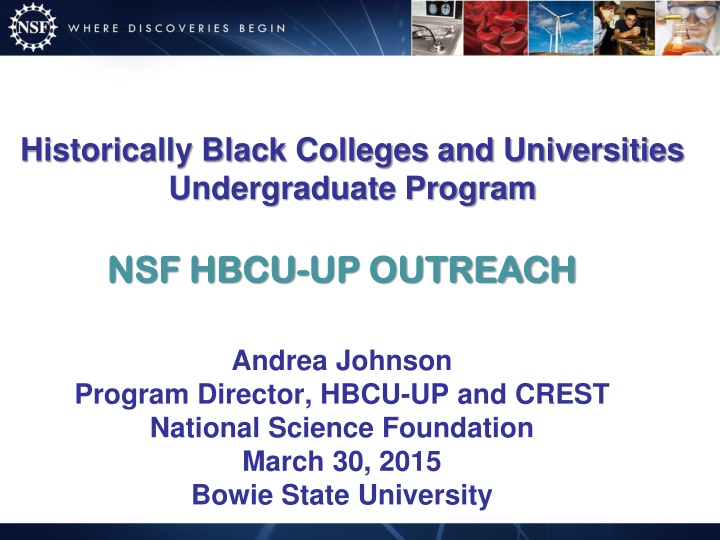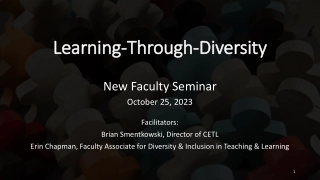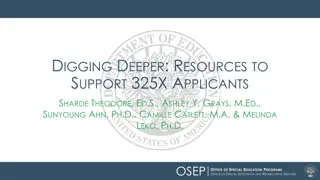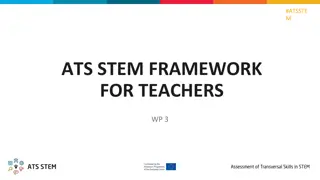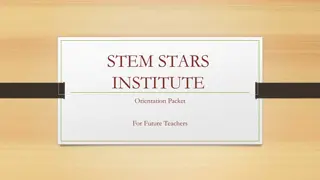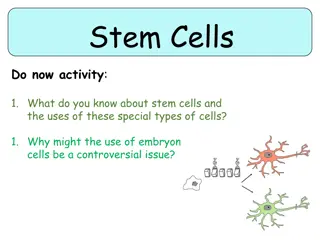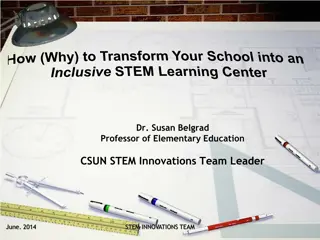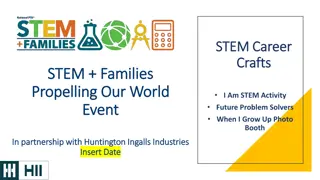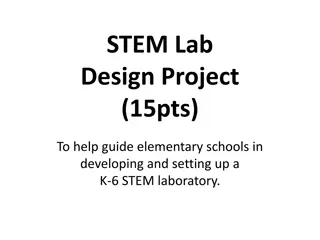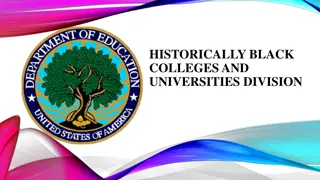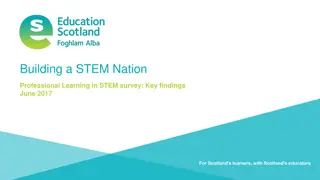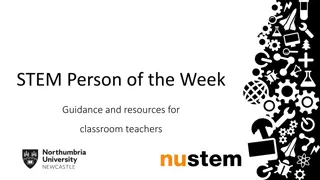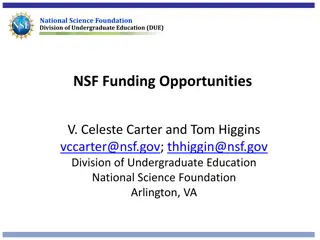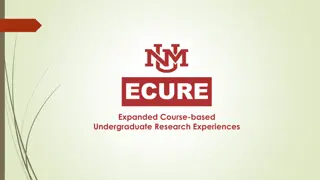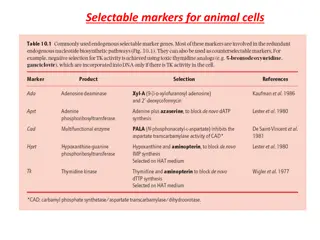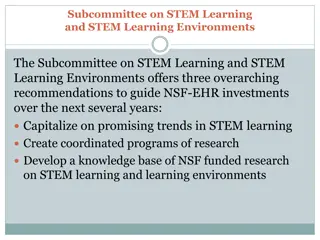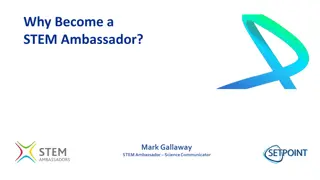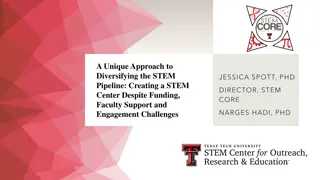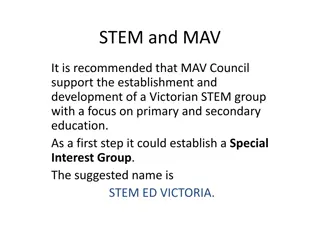Enhancing Undergraduate STEM Education at HBCUs
Committed to broadening participation in STEM workforce through innovative projects at Historically Black Colleges and Universities. Program focuses on supporting faculty research and improving undergraduate STEM education quality.
Download Presentation

Please find below an Image/Link to download the presentation.
The content on the website is provided AS IS for your information and personal use only. It may not be sold, licensed, or shared on other websites without obtaining consent from the author.If you encounter any issues during the download, it is possible that the publisher has removed the file from their server.
You are allowed to download the files provided on this website for personal or commercial use, subject to the condition that they are used lawfully. All files are the property of their respective owners.
The content on the website is provided AS IS for your information and personal use only. It may not be sold, licensed, or shared on other websites without obtaining consent from the author.
E N D
Presentation Transcript
Historically Black Colleges and Universities Undergraduate Program NSF HBCU NSF HBCU- -UP OUTREACH UP OUTREACH Andrea Johnson Program Director, HBCU-UP and CREST National Science Foundation March 30, 2015 Bowie State University
HBCU HBCU- -UP PROGRAM UP PROGRAM Committed to enhancing the quality of undergraduate STEM education and research at HBCUs in order to broaden participation in the nation s STEM workforce and STEM graduate programs Historically Black Colleges and Universities (HBCUs) that are accredited and offer undergraduate educational degree programs in science, technology, engineering and mathematics (STEM)
Institutional Eligibility Institutional Eligibility Historically Black Colleges and Universities (HBCUs) that are accredited and offer undergraduate educational degree programs in science, technology, engineering and mathematics (STEM)
HBCU HBCU- -UP Program Solicitation UP Program Solicitation NSF 15 NSF 15- - 552 552 FY 2015-2016 HBCU-UP program solicitation: http:// http://www.nsf.gov/pubs/2015/nsf15552/nsf15552.htm www.nsf.gov/pubs/2015/nsf15552/nsf15552.htm The Proposal and Award Policies and Procedures Guide, which contains the Grant Proposal Guide, is available at: http http:// ://www.nsf.gov/pubs/policydocs/pappguide/nsf15001/nsf15_1.pdf www.nsf.gov/pubs/policydocs/pappguide/nsf15001/nsf15_1.pdf
Whats New? What s New? Broadening Participation Research Centers Implementation Projects (2nd and 3rd round), Achieving Competitive Excellence (ACE) Implementation Projects require the inclusion of an education research project that is linked to the proposed approaches and interventions at the HBCU 2ND and 3RD Implementation Projects (IP) award size: $2 million.
HBCU-UP TRACKS Targeted Infusion Projects (TIP) DESCRIPTION Support to achieve a short-term, well-defined goal to innovate or improve the quality of undergraduate STEM education Awards Number of awards: 15 Project length: 2-3yrs Award size: $400,000 Submission: 2/yr Active: 1 per Dept. Support STEM faculty to pursue research at the home institution or at NSF-funded research center, a research intensive institution or a national laboratory Support research projects that seek to create and study new theory-driven models and innovations related to the participation and success of underrepresented groups in STEM undergraduate education Number of awards: 20 Project length: 3yrs Award size: $300,000 Restrictions: equipment costs 20% Submission: 2/yr Number of awards: 6 Project length: 3yrs Award size: $350,000 Submission: 2/yr Research Initiation Award (RIA) Broadening Participation Research (BPR) Projects Division of Human Resource Development (HRD): AGEP; CREST; LSAMP; TCUP; HBCU-UP
HBCU-UP TRACKS DESCRIPTION Awards Provide support to design, implement, study, and assess comprehensive institutional efforts to increase the number of students receiving undergraduate degrees in STEM and enhance the quality of their preparation by strengthening STEM education and research Intended for HBCUs with exemplary achievements and established institutionalized foundations from previous IP grants Number of awards: 6 Project length: 4-5 yrs Award size: $1-2 mil Restrictions: equipment costs 30% Submission: 1/yr Active: 1 Implementation Projects (IP) Achieving Competitive Excellence (ACE) Implementation Projects Number of awards: 2 Project length: 5 yrs Award size: $3 mil Restrictions: equipment costs 30% Provide support for the rigorous study and broad dissemination of the critical pedagogies and culturally sensitive interventions Broadening Participation Research Centers (BPRC) Number of awards: 1 Project length: 5 yrs Award size: $9 mil Submission: 1/yr Requirement: 3 rounds of IP or ACE
Targeted Infusion Targeted Infusion Projects Targeted to meet a short-term, well-defined goal to improve the quality of and make innovations in undergraduate STEM education Projects Create or adapt innovative learning experiences and pedagogies in STEM fields Develop creative uses of cyberlearning Enhance academic infrastructure by: updating curriculum, modernizing lab research equipment or improving the computational network array for research and education Projects that develop faculty expertise, promote implementation of educational innovations or link to the preparation of future K-12 teachers encouraged
Research Initiation Awards (RIA) Research Initiation Awards (RIA) Principal Investigator- Faculty member in a STEM discipline at the HBCU Co-Principal Investigators and senior personnel are not permitted. Eligibility: Junior faculty who are starting to build a research program Mid-career faculty who may have returned to the faculty ranks after holding an administrative post or who for some other reason need to redirect and rebuild a research program. Faculty members who hold an active research award are not eligible for the Research Initiation Award.
BROADENING PARTICIPATION RESEARCH (BPR) IN STEM EDUCATION Proposed research may investigate behavioral, cognitive, affective, learning and social differences as well as organizational, institutional or systemic processes that may impact participation and success in STEM education. Create and study new models and innovations in STEM teaching and learning Enhance the understanding of the underlying issues affecting the differential participation and success rates of African-American students Add to the research knowledge-base Inform STEM education practices and interventions
Implementation Projects Implementation Projects undertake comprehensive institutional reform and transformational strategies to strengthen and enhance STEM teaching and learning and to improve student access and retention in STEM areas. Create and/or adapt and assess innovative models and materials for teaching and learning in STEM Embody knowledge about how students learn most effectively in STEM teaching and learning activities Bring STEM disciplinary advances into the undergraduate experience Components of the implementation design should comprise research-based or evidence-based practices and strategies Critical aspects of implementation projects: transferability and dissemination of successful models, effective methods, and innovative materials for educating undergraduate STEM students
ACE Implementation Projects ACE projects are ambitious, potentially transformative proposals that have the promise of significant advances in STEM undergraduate education at the institution. ACE projects should create more and varied pathways to success for STEM students by increasing intellectual resources. Possible approaches might include: establishing new collaborations and alliances with public and private research institutions, centers, and national laboratories providing access to tomorrow's science through computationally intensive tools and global networks increasing fiscal resources for frontier STEM education and research through innovative institutional integration, leveraging partnerships, and strong linkages with business and industry
BROADENING PARTICIPATION RESEARCH BROADENING PARTICIPATION RESEARCH CENTERS (BPRC) CENTERS (BPRC) Centers will offer the HBCU community a venue for interaction and an effective mechanism to undertake long-term integrated research and education activities in the science of broadening participation; and to develop approaches to ensure the transfer of knowledge of research and education advances
BROADENING PARTICIPATION BROADENING PARTICIPATION RESEARCH CENTERS (BPRC) RESEARCH CENTERS (BPRC) Build the intellectual infrastructure to facilitate the creation, integration, and transfer of new knowledge in broadening participation research Produce work that adds to the research knowledge- base and will enhance the understanding of the barriers that hinder and factors that enhance our ability to broaden participation in STEM Institutions that have been awarded three previous Implementation or ACE Implementation Projects are eligible to be the lead institution
OTHER OTHER HBCU HBCU- -UP UP FUNDING OPPORTUNITIES FUNDING OPPORTUNITIES Conferences (Grant Proposal Guide (GPG) II.D.9.) Early-concept Grants for Exploratory Research (EAGER); II.D.2 Grants for Rapid Response Research (RAPID); II.D.1. Planning grants (12-18 months) to undertake an institutional STEM program self-analysis in preparation for submittal of an Implementation Project or a Broadening Participation Research Center. Planning grants are submitted as unsolicited proposals. PIs are advised to discuss the planning grant proposal with a program director before submission. Grant Supplements for existing awards IP or ACE IP ( $100,000) to establish sustainable practices and mechanisms to prepare students to compete successfully for graduate research fellowships such as the NSF Graduate Research Fellowship
FY 2016 FY 2016 AWARDS AWARDS Estimated Number of Awards: 50 Anticipated Funding Amount: $21.9 million
HBCU HBCU- -UP Calendar UP Calendar Letters of Intent RIA: July 29, 2015 TIP, BPRP, IP, ACE IP: October 14, 2015 Preliminary Proposals BPRC: June 22, 2015 Full Proposal Deadlines RIA: October 7, 2015 TIP, BPRP, IP, ACE IP: December 16, 2015 BPRC: January 20, 2016
Revisions for All NSF Proposals Revisions for All NSF Proposals Cost Sharing: Prohibited. Mandatory cost sharing will only be required when explicitly authorized by the NSF Director. Project Project Summary Summary must contain an Overview and address the two merit review criteria in the one-page project summary. Separate headings are no longer needed. Project Project Description Description for NSF proposals, must contain a a discussion of the broader impacts discussion of the broader impacts of the proposed activities. Intellectual Merit and Broader Impact activities must be described in two separate sections in the summary of Results from Prior NSF Support.
Evaluation Plan Evaluation Plan Should describe how the evaluation will determine the accomplishment of project goals and project impact. Should be based on a Logic Model or other tool that relates project goals to activities and to outputs, outcomes, and impact. Should include formative and summative components and both qualitative and quantitative methodology. Note: Budget MUST include adequate resources for the project evaluation and credentials of the external evaluator should be included as supplementary documents.
Easy Dismissal Easy Dismissal Common Criticisms of Declined Proposals Common Criticisms of Declined Proposals Vague Plans or Objectives Unrealistic Assumptions Lack of Coordination Among Partners Insincere or Absent Commitment Lack of Innovation or Uniqueness Inappropriate Personnel or Proposed Roles Spelling, Typos, Arithmetic, Excessive Length or Density
Avoiding Easy Dismissal Avoiding Easy Dismissal Common Reasons for Project Failure Common Reasons for Project Failure Inconsistent or Absent Management Lack of Collaboration Among Partners Weak Evaluation Plan Inappropriate Personnel Undocumented Policies and Milestones Lack of evidence base for proposed student centered activities.
Merit Review Process Merit Review Process (Proposers should note both merit review guidelines and proposal preparation instructions)
Merit Review Criteria Merit Review Criteria Both criteria, Intellectual Merit and Broader Impact , will be given full consideration during the merit review and decision-making process. Each criterion is necessary but neither, by itself, is sufficient. Proposers must fully address both criteria. The following elements should be considered in the proposal s review for both criteria: What is the potential for the proposed activity to advance knowledge and understanding within its own field or across different fields (Intellectual Merit); and benefit society or advance desired societal outcomes (Broader Impacts)?
NSF Merit Review NSF Merit Review Criteria, Cont d To what extent do the proposed activities suggest and explore creative, original, or potentially transformative concepts? Criteria, Cont d Is the plan for carrying out the proposed activities well- reasoned, well-organized, and based on a sound rationale? Does the plan incorporate a mechanism to assess success? How well qualified is the individual, team, or institution to conduct the proposed activities? Are there adequate resources available to the PI (either at the home institution or through collaborations) to carry out the proposed activities?
Stay Connected Stay Connected Submit Proposals Serve as Reviewers and Panelists Be Active as Workshop Participants and Organizers Consider Being a Rotator http://www.nsf.gov/about/career_opps/rotators/index.jsp For information on a particular EHR division and program, go to the EHR website and choose a division. http://www.nsf.gov/dir/index.jsp?org=EHR Contact NSF Program Directors for questions and suggestions.
Useful Resources Useful Resources NSF: www.nsf.gov Guide to Program: www.nsf.gov/funding/browse_all_funding.jsp Award Information: www.nsf.gov/awardsearch FastLane: www.fastlane.nsf.gov Data Management Plan: www.nsf.gov/bfa/dias/policy/dmp.jsp Funding Opportunities: www.nsf.gov/funding
Program Contacts Program Contacts Andrea Johnson andjohns@nsf.gov 703-292-5164 Claudia Rankins crankins@nsf.gov 703-292-8109 Earnestine Easter epsalmon@nsf.gov 703-292-8112 Martha James mjames@nsf.gov 703-292-7772 Toni Edquist tedquist@nsf.gov 703-292-4649
